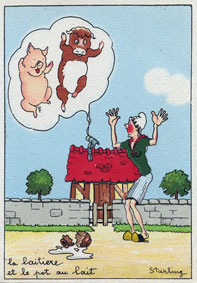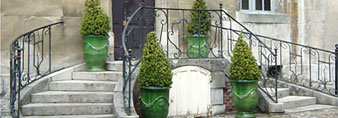THE STAGE-COACH AND FLY.
Up a steep hill and painful road of sand,
While to the sun exposed on every hand,
Six powerful horses drew a carriage on :
Women, old men, and friars all got down.
The horses smoked and panted—at a stand.
A fly came up, and seemed to take command ;
Thought to excite them by his buzzing song,
Stung them by turns to make them get along,
And every moment thought to see them go—
Sat on the seat-sat on the driver's nose.
Soon as he saw the carriage moving slow,
The travellers marching on—his pride arose ;
And to himself the praise he took ;
Went round with eager haste, and seemed to look
Like some bold battle-serjeant out of breath,
Pressing his ranks to victory or death.
The fly complained that in this joint affair
He acted singly, and had all the care—
None helped him in his work with kind accord :
The friar o'er his breviary pored ;
Fit time indeed !—A woman sang the while—
Was singing there required to soften toil !
The fly went buzzing to their ears his thanks,
And played a hundred, wicked pranks.
After much toil the coach arrived on high :
“ Let's breathe a little now ! ” exclaimed the fly ;
“ I've worked so hard, we've got upon the plain‑
Come, my good horses, pay me for my pain.”
Thus certain people, with important air,
Meddle with business they know nought about ;
Seem to be wanted everywhere,
And everywhere they ought to be turned out. |
| |
THE MILK-MAID AND MILK-PAIL.
Dolly with milk-pail on her head,
Well balanced by a pad,
Of getting safe to market had no dread,
Skipping along so thinly clad ;
For to be light that day, she chose
Her shortest petticoat and flattest shoes.
Thus trimmed, her journey she began,
And all her thoughts already ran
Upon her market cash—and buying goods—
That fast in fond idea breed.
She bought a hundred eggs that gave three broods ;
...And all went well, she took such heed.
“ I think,” she cried, “ it will be hard indeed
If I don't bring up chickens round my door ;
Reynard on me must run a cunning rig,
If he don't leave enough to buy a pig,
Which I shall fatten for a trifle, sure.
He was, when I first had him, pretty big ;
When sold again, he’ll bring a pretty sum,
.The profit more than half;
And what shall hinder me to see at home
A goodly cow and calf ?
Around the flock I think I see him skip ! ”
On this poor joyful Dolly made a slip—.
-The pail came down—adieu calf, cow, pig, broods.
With downcast looks the lady of these goods,
Thus seeing all her fortune fail,
Went home her husband's clemenee to entreat,
Great risk she ran of being beat.
They made a farce out of the tale,
And called it hence the Milken-Pail.
Many this fond delusion share,
And build such castles in the air.
Pyrrhus and Picrochole, all regal powers,
Wise men and milk-maids here alike mistake,
And pass their time in dreaming wide awake.
Ours are all goods, girls, honours, all are ours.
I brave all perils, musing thus alone,
And wander, chasing monarchs from their throne ;
I'm great, I'm chosen king—they me adore ;
A turn—and I'm but poor Jean as before.
|

|
THE CURATE AND DEATH.
A corpse moved slow and solemn on the road,
To take possession of his last abode ;
A curate went smiling along, and so gay,
To get him interred without farther delay.
Borne on the sable hearse, they pass,
The dead man dressed with decent care,
Clothed in that mournful robe, alas !
..They call a coffin or a bier—
Through golden summer and through winter hoar,
A robe the dead throw off no more.
The parson, seated by the lifeless clay,
Recited in his common way
Many prayers, and psalms, and verses,
..With the lessons for the day ;
All the service he rehearses.
“ Come, good Mr. Corpse,” said the curate with glee,
“Leave the care of this business entirely to me :
The fee is the subject that runs in my head.”
Master Chouart now feasted his eyes on the dead,
As a treasure that robbers might carry away ;
And his looks sparkled pleasure, as if he would say,
I'll have so much in money, and so much for wax,
And on every trifle I'll levy a tax.
From this and from that Master Chouart on fine
Determined to purchase a good piece of wine,
The best that could be furnished him ;
..And for a niece that went so trim,
With chamber-maid Miss Polly Prim,
Fine dresses he in wandering fancy bought.
But while so ravished with the thought,
The hearse broke down, and broke poor Chouart's head.
The lordly corpse, whose coffin was of lead,
Gave the rejoicing parson such a blow,
That both together were laid low.
In fact, through life we all thus go,
Our expectations, like the curate's, fail,
..Or like the milk-maid's falling pail. |
|
THE MAN RUNNING AFTER FORTUNE,
AND THE MAN WAITING FOR HER
ON HIS BED.
Who runs not after Fortune here below ?
Would I were placed where I might see the race,
And contemplate the busy crowd that go
From kingdom still to kingdom, in the chase
Of Fate's fair dame, so fickle and so light,
Who still eludes her faithful votaries' sight.
The happy moment they are near the prize,
The courted lady mocks their ardent eyes.
Poor dupes ! I pity them, for fools, we state,
-Are objects of compassion, not of hate.
A cabbage-planter, say they, such a one ;
Behold him seated on the papal throne :
Have we less worth ? far more, perhaps, than he ;
But what is worth, since Fortune cannot see ?
Say, is the triple crown worth what we lose—
Repose ? such precious treasure is repose,
That 'twas the portion of the gods of old,
Seldom the lot that Fortune grants with gold.
Cease then to follow the inconstant dame ;
She'll follow you, her sex are just the same.
Two friends established in a certain town,
Possessed some wealth. One ever and anon
For fortune sighed, said to his friend one day,
“ Suppose we here no longer stay ?
Merit, you know, is seldom known at home :
Let's go abroad, and for our fortune roam.”
“ Go,” said the other, “ wander till you tire ;
No better fate nor climate I desire.
Indulge the restless fancy of your head :
You'll soon return, yet I'll a vow fulfil,
To pass your absence on my bed. ”
The greedy man, or miser if you will,
Set off, o'er hill and dale, arrived next day
Where, sure, the giddy goddess must resort
More than at any place—I mean at court.
There, then, some time he fixed his stay,
Went to the levee, to the evening hour,
The fittest time to meet with rank and power ;
In short, went everywhere, and nothing found.
“ Strange !” thought he, “ I must try some other ground ;
..Yet fortune here inhabits round ;
I see her daily enter here and there.
..How comes it that with all my care
.. I cannot also lodge her grace ?
I have been told the gentry of this place
Don't always relish this aspiring view ;
Adieu then, courtiers—courtiers, then adieu ;
Follow on still the shade that flatters you.
Fortune has temples at Surat, they say ;
I'm off.” He said, embarked, got under way.
Men's souls are brass, but adamant was his,
Who ventured first a liquid way like this,
And dared defy the terrible abyss !
Through dangers often as our traveller passed,
His eyes toward his peaceful village cast,
'Midst pirates, calms, and storms, and rocks,
The ministers of death. Thus through dire shocks,
In search of her to distant shores they roam,
Whom they might find and never stir from home.
..At Great Mogul arrived our man :
They told him there, that at Japan
Fortune was then distributing her smiles,
For which he straight set out.
The waves were wearied tossing him about ;
..And all he reaped from his long toils
..Was but the lesson natives give ;
Keep to the soil where nature bids you live.
As at Mogul, so at Japan he fared,
Which made him wish at last his travels spared.
He then abandoned all such schemes of gain ;
And for his native village ploughed the main
He landed—wept for joy, and cried,
As he the distant peaceful roof espied :
“ Happy the man who forms his bliss at home,
Ruling his passions, careless thus to roam !
Who but by hearsay knows at his fireside
Of courts, or storms, or Fortune's great domain,
Dazzling our eyes in vain—
For pomp or wealth led o’er the earth,
With promises that often end in dearth 1
I'll stir no more from my thrice-happy plain.”
Thus as he reasoned matters o’er,
With strongest resolution bound,
And in his turn at Fortune frowned,
He found her smiling, sitting at the door
Of his old friend, lost in a sleep profound. |
|



